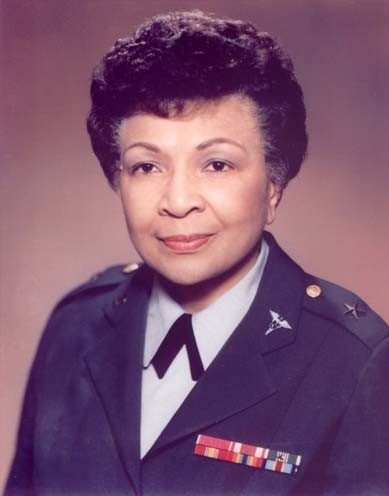DNA Celebrates Black History Month 2025 The history, and continued history-making, of black nurses in Delaware is remarkable. DNA is humbled and honored to celebrate Black History Month every February. We commit to embracing, uplifting, and advocating for the diversity, inclusion, belonging, equity, and prosperity of all diverse nurses and individuals residing in Delaware. Below are 8 extraordinary nurses with Delaware roots or connections that are worth knowing and celebrating, this month and every day. |
Jane E. Mitchell 1921 - 2004
Jane Mitchell, a registered nurse and a native of Claymont, returned to Delaware with her husband in 1945 after World War II had ended. She had earned her nursing degree at Provident Hospital in Baltimore, a well-known teaching hospital for African Americans. Mitchell had trained in a hospital and wanted to be a hospital nurse, but because of her color, she could not get a job in her home state. For a few years, Mitchell worked in a Philadelphia hospital, but in 1949 she became the first African American nurse to break the color barrier in Delaware when she was hired at the new Governor Bacon Health Clinic in Delaware City. Some white nurses protested Mitchell's hiring, and her years at Governor Bacon were not easy ones. White patients sometimes shrank from her caring touch, and her colleagues did not include her in their social life. Still, black patients at the hospital were grateful to have a sympathetic nurse, and other black nurses across Delaware cheered her on. Most importantly, she loved the work. After several years, Mitchell left Governor Bacon to work as a nurse at Delaware State Hospital outside of Wilmington, and she eventually became Director of Nursing there. In her position, she was able to hire and promote the nurses she supervised without regard to race and color but on the basis of skill and dedication. It pleased her to encourage deserving black nurses and to make sure they received the consideration she had not received in her younger years. Sources | No Known Photos Rebecca Lee Crumpler 1831-1895
Dr. Rebecca Lee Crumpler was born Rebecca Davis in 1831 in Christiana, Delaware to Absolum Davis and Matilda Webber. Her childhood was spent with an aunt in Pennsylvania. Her aunt frequently cared for sick neighbors, and Crumpler accompanied her aunt on these trips. In her book, published in 1883, Crumpler wrote these experiences with her aunt inspired her to go into medicine. Crumpler wrote, “Having been reared by a kind aunt in Pennsylvania, whose usefulness with the sick was continually sought, I early conceived a liking for, and sought every opportunity to be in a position to relieve the sufferings of others.” By 1852, Crumpler had moved to Charlestown, Massachusetts to begin her medical career as a nurse. In the early 1850s, there was no formal school where one could become licensed as a nurse (the first one opened in 1873), so she performed her medical duties without any formal education. Crumpler assisted several doctors in the Boston area for eight years. Her life in Massachusetts also included a husband; Crumpler married Wyatt Lee, a Virginia laborer, in 1852 in Charlestown. In 1860, Crumpler became the first—and only—African American woman accepted to the New England Female Medical College in Boston. The College, established in 1848, was the first to award MD’s to women. It was also unique in that it allowed Crumpler to attend as most medical schools barred all African Americans—both men and women—from attending. Sources |
Hazel W. Johnson-Brown 1927-2011
General Hazel Johnson-Brown wanted to be a nurse since she was a child. After being rejected by the West Chester School of Nursing because of her race, she enrolled in the Harlem Hospital School of Nursing. She joined the Army in 1955 and served on the medical-surgical ward at the Walter Reed Army Medical Center. In 1959 she earned her BSN and returned to the Army. She qualified as an operating room (OR) nurse and worked at Walter Reed from 1960-1962 when she left to pursue her master's degree. She taught OR nurses until 1966 and then accepted a special assignment to evaluate a mobile unit, self-contained, transportable hospital that became the 45th surgical hospital in Vietnam. She was later nominated to become the 16th chief of the Army Nurse Corps and promoted to brigadier general. During her leadership, she started several programs and encouraged quality assurance development in treatment facilities. In 1983 she accepted an appointment as an assistant professor at Georgetown University School of Nursing. She spent her final years with her sister in Wilmington, Delaware, and died in 2011. Sources |
Henrietta R. Johnson 1914 - 1997
Henrietta Johnson, a nurse for over 20 years made political history in Delaware by becoming the first African American woman elected to the Delaware General Assembly House of Representatives. During her two- term tenure, Henrietta Johnson fought for the Southbridge community, supporting legislation that benefited community-based social services, offered financial assistance to senior citizen organizations, increased welfare benefits and fostered the renovation of schools. Representative Johnson’s personable nature, “gave her the ability to get along with the members of the General Assembly and helped her to pass controversial bills.” Some of her legislative accomplishments include House Bill 992 or the ‘Delaware Adolescent Program, Inc.’ which helped pregnant and unwed teenagers obtain their education by providing childcare and healthcare for their new families. She also introduced a bill aimed at providing food stamps to low-income citizens. Representative Johnson served as a mentor for other African American men and women in Delaware Politics. In 1980, Henrietta Johnson was honored for her years as a tireless representative of the people of Southbridge and the City of Wilmington at large by having a multi-purpose facility named in her honor... Henrietta Johnson Medical Center. Sources |
Renee P. Beaman
Renee Beaman has been named director of the Division of State Service Centers, which operates Delaware Department of Health and Social Services' network of one-stop facilities for individuals accessing government services. Beaman, who started the job last week, served as founder and executive director of Beautiful Gate Outreach Center, an HIV/AIDS prevention and outreach program that operates out of Bethel AME Church in Wilmington. Under her leadership, the center has created more than 25 programs – including HIV testing in the emergency department at Wilmington Hospital and an on-site medical clinic in partnership with Christiana Care Health System – that serve thousands of Delawareans. Beaman has received numerous awards for her HIV ministry work and is a certified HIV counselor and tester. She was a speaker at the 2012 International AIDS Conference in Washington. She is a certified pediatric and cardiology registered nurse. Sources |
Melissa Minor-Brown
She graduated cum laude in the practical nursing and registered nurse programs at Delaware Technical Community College and launched her nursing career at the Veterans Affairs Hospital in Elsmere. “I literally used to run away from political conversations,” Minor-Brown said. “But as I worked through the healthcare field and continued to elevate in that space, I was always seeing room for opportunities to change things and I felt like my voice was not being heard.” When one of her patients passed away, she decided to stop wishing for change and start making it happen. The patient was a man experiencing homelessness. He couldn’t afford his prescription and was made to try different medications rather than take the one that could have saved his life. Rep. Melissa ‘Mimi’ Minor-Brown is determined to make a difference by using her platform as a springboard for change, advocacy, and empowerment for her community. Rep. Minor-Brown knows what it means to work hard. She is an American success story, pulling herself up as a single teenage mother to evolve into a licensed practical nurse, to a registered nurse with a master’s degree in Executive Leadership, graduating Cum Laude from Wilmington University, to now serving as a legislator in Delaware’s House of Representatives. Rep. Minor-Brown continues to offer a hand up to those she serves. She is staunch supporter for the less fortunate and always strives to provide a voice for the voiceless. She is an advocate for nursing continually seeking opportunities to advance the profession. To that end, Rep. Minor-Brown has been recognized as a Delaware Top Nurse Honorable Mention in 2018 and 2022. She was recently awarded the Dr. Kitty Esterly Health Equity Award from Delaware Healthy Mother and Infant Consortium where she serves as the lead for the Doula Task Force and the Social Determinants of Health Committee. She also was awarded the 2023 Delaware Top Nurse in the Leading and Advancing the Profession category. On a broader scale, Rep. Minor-Brown serves as the Region III Chair for the National Black Caucus of State Legislators. Sources |
Sharon Mills-Wisneski
She is a graduate of Widener University (MSN, PhD) and Wesley College, ADN, BSN). Clinical Experience includes former ICU-per-diem staff nurse and Medical-Surgical staff nurse. Research Expertise: Nursing Research, both Qualitative and Quantitative Research Methods; Women’s Health Disparities, African American Women with breast cancer and cancer survivorship. Nursing Education: African American nursing students, student retention and academic success, and cultural and social issues. Specialization: Nursing Education, Research, Oncology, and Palliative Care. Sources | Ruth Oates-Graham 1942-2023
Ruth Oates-Graham “helped to ensure that quality pre-hospital emergency care was available in Delaware.” She received a nursing degree from Wilmington General Hospital School of Nursing and continued her education through Public Health Nursing courses at Millersville State College, as well as a bachelor’s degree from Wilmington College in 1980. Oates-Graham became a curriculum coordinator for the Nursing School of Wilmington, and “distinguished herself by the impact she made on the future nursing practices of her students.” She then went on to become the Director of Delaware’s Advanced Emergency Medical Technician School at the Medical Center of Delaware, receiving national recognition for heading one of the best pre-hospital life support programs in the country. As the director of the Office of Paramedic Administration, Ruth was responsible for the implementation of a comprehensive and advanced life-support system to provide pre-hospital medical care. She was one of the few women, and only Black woman to hold such a position in the U.S in the 1990s. Ruth was inducted into the Hall of Fame for Women in Delaware in 1985. Ruth had a passion for education. Beyond the medical field, she served on PTA’s, School Boards, the parent advisory board for F.A.M.E. Inc. at its inception and was president of the Wilmington Home School Community Council. Along with a mighty corps of education advocates, Ruth was on the front lines of educational equity for black and brown children though out the 70’s and 80’s. In the early 80’s she served as a member of the University of Delaware’s Board of Trustees. Sources |






